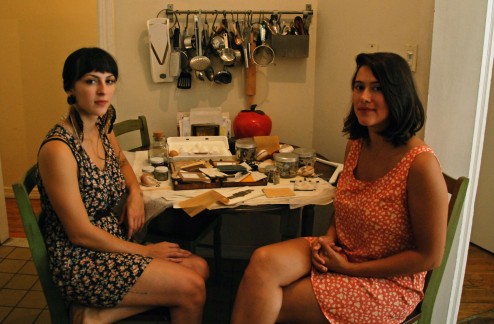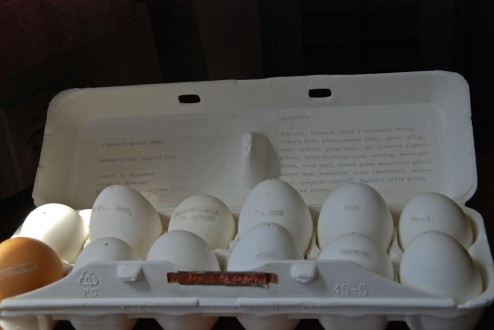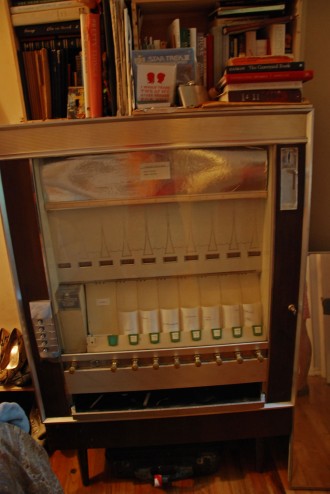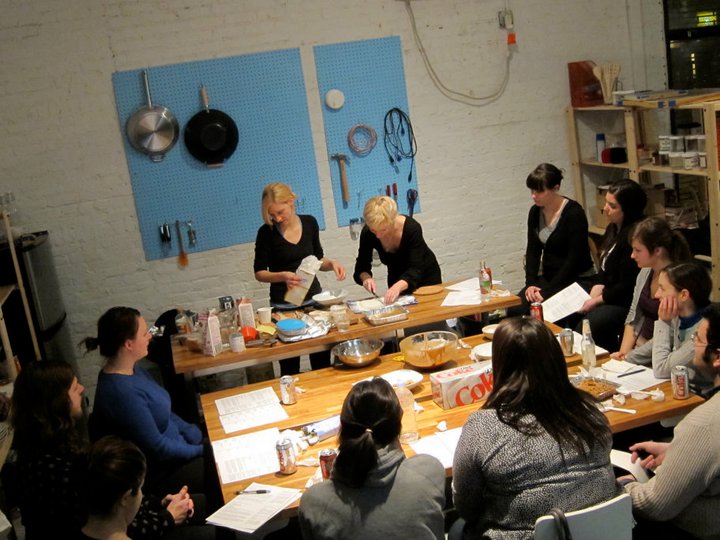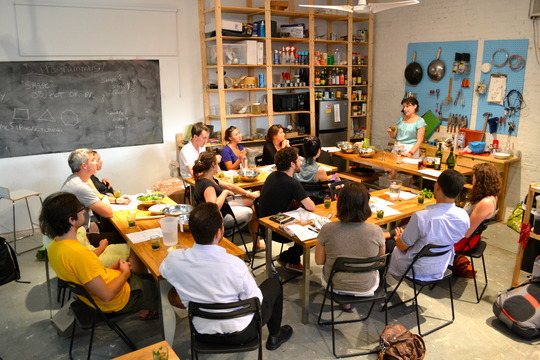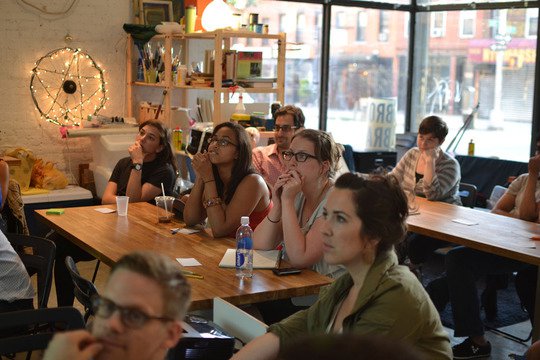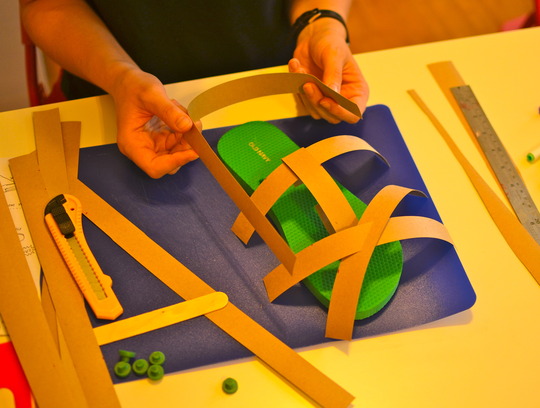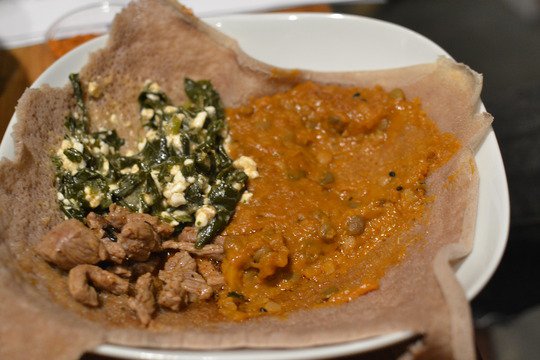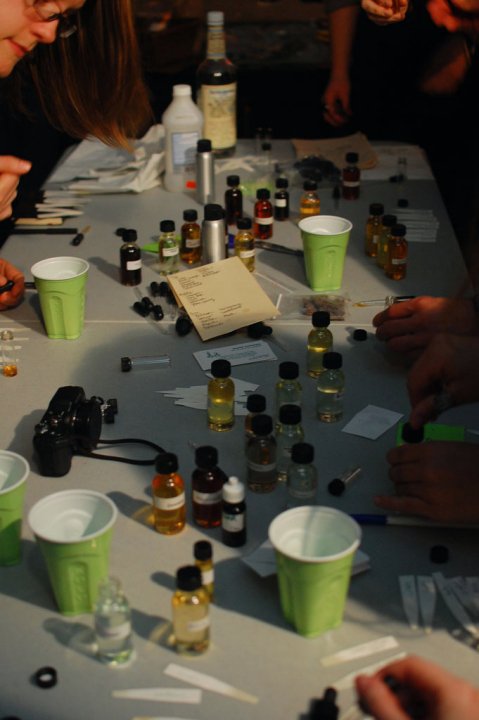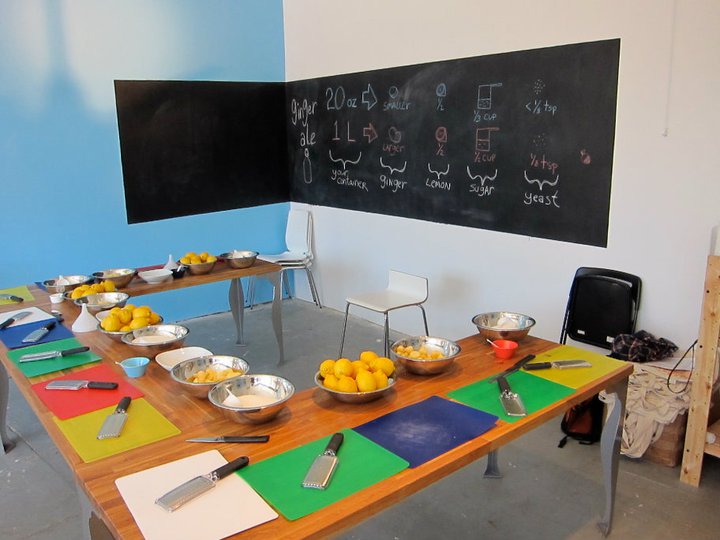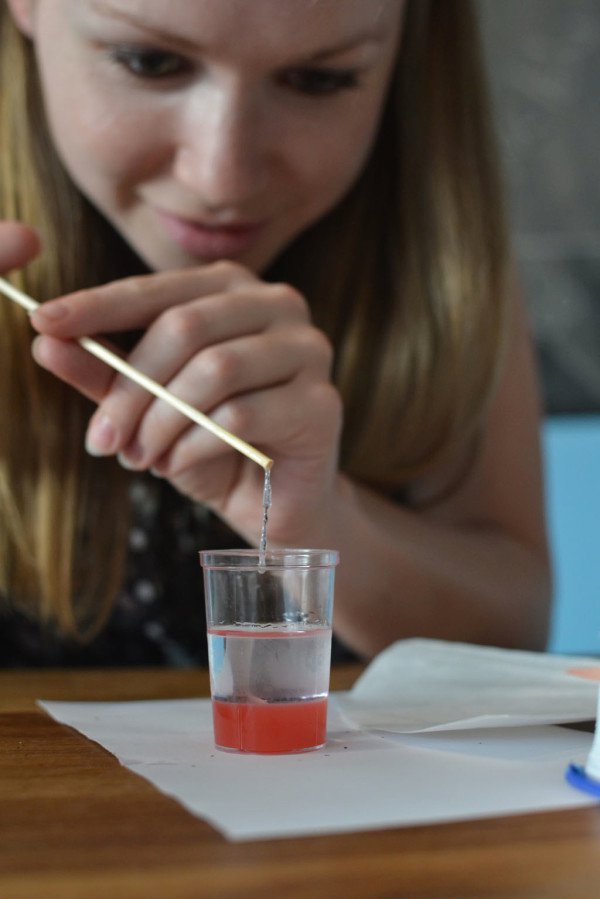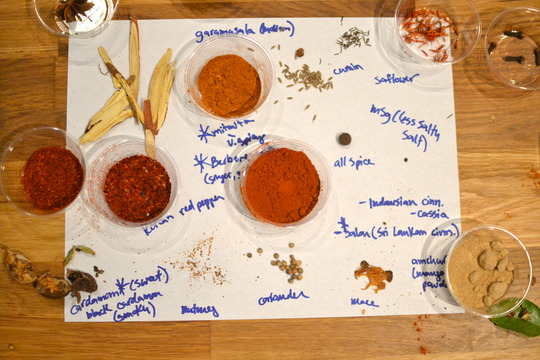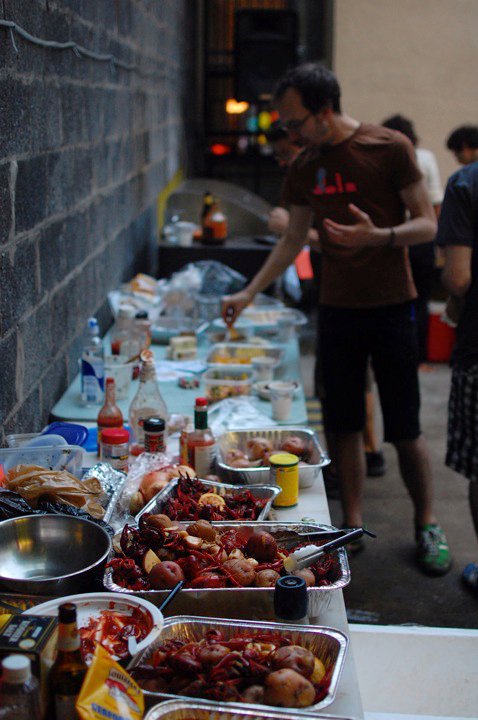a wrecked tangle press
space type: art press | neighborhood: prospect heights | active since: 2007 | links: website, facebook, myspace
There’s no doubt that Brooklyn is a literary utopia. We’ve got writers winning all the most important awards, we’ve got a massive annual book fair, and we’ve got some of the hardest-working, most innovative small presses in the world, like Akashic, powerHouse, Soft Skull, Archipelago, Melville House, and Ugly Duckling Presse.
Another thing we’ve got is artists’ books. At the intersection of DIY crafting, zine culture, writing, and art, artists’ books are limited only by the imagination of the maker. I covered artist-book gallery Central Booking several months ago, without realizing that gallery assistant Jessica was one half of the artist-book micropress A Wrecked Tangle. In their Prospect Heights apartment, Jessica and her partner Alaska make tiny editions of gorgeous books of poetry, prose, and photographs, using a crazy amount of different materials, from dirt to teddy bear eyes to hair to eggs. Their books have been exhibited at Proteus Gowanus, Dog Eared, The Extra-Illustration Project, 139, The Human Book Project, Rutgers University Book Arts Symposium, and more. Unsurprisingly, they’re smart, fun, engaging women, with lots of ideas about books and art and the way Brooklyn makes it all possible.
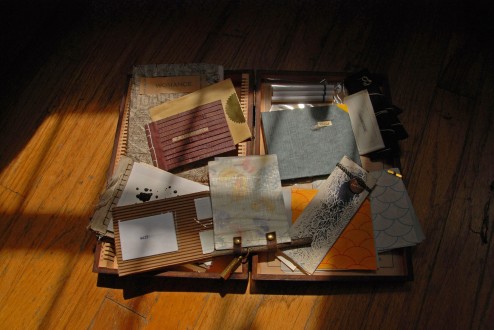 [all photos by Maya Edelman]
[all photos by Maya Edelman]
brooklyn spaces: What made you decide to
start making art books?
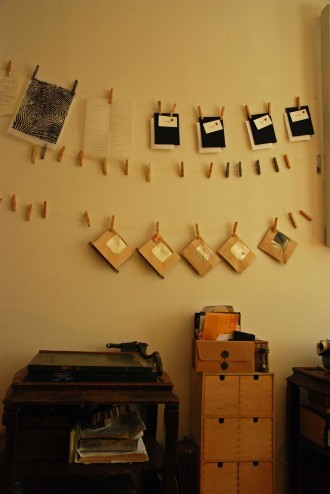 Alaska: We both spent a
ton of money going to Pratt for creative writing and then realized that we were
doing nothing with it, so one day I brought over a typewriter and all this scrap
paper, and we just made a book. It was called Objects Hiding Access to Sanctuaries. We made
seven copies and mailed them to people whose work we liked or who we felt were
kindred spirits. Each book had the same pages, but we used different materials
for certain elements, and they all came with an engraved skeleton key.
Alaska: We both spent a
ton of money going to Pratt for creative writing and then realized that we were
doing nothing with it, so one day I brought over a typewriter and all this scrap
paper, and we just made a book. It was called Objects Hiding Access to Sanctuaries. We made
seven copies and mailed them to people whose work we liked or who we felt were
kindred spirits. Each book had the same pages, but we used different materials
for certain elements, and they all came with an engraved skeleton key.
Jessica: There’s always a souvenir with our
books. It’s supposed to be an experience that you take something away
from.
Alaska: The first year or so that we were
making stuff it was for fun, just to make the world a more beautiful place, that
thing D.H.
Lawrence said about how artists create a world for each other that’s fit
to live in. But eventually we decided it’s not selling out to be in galleries,
and also we wanted people who love books to see our books. So we started trying
to find more people in the book community who were interested in seeing our
work.
brooklyn spaces: How many books have you
done?
Jessica: I don’t know. We’ve done a lot of
really small editions, and there are books we’ve made that we haven’t kept any
record of.
Alaska: If I had to ballpark it, I’d say
thirty.
Jessica: Working in book art also makes you
question what really qualifies as a book. One of the things we did is called
The Bee Does Not Keep the Honey, which is a
honeycomb made out of packaging and stuffed full of rolls of paper. Is that a
book?
Alaska: We just went through a really
book-object-y phase, where things got kind of sculptural for a while, and I
think that that still affects how I look at making books or just what a book is.
We did this book Beginning that’s a dozen eggs with poems and
objects inside that all relate to kinds of beginnings, and you have to break
them open to read them. That has chapters that relate to a theme, but it’s not a
book exactly.
brooklyn spaces: So what would be your
definition of what makes a book?
Jessica: It’s funny but we’ve never
actually been asked that.
Alaska: I feel like I’ve been avoiding that
question.
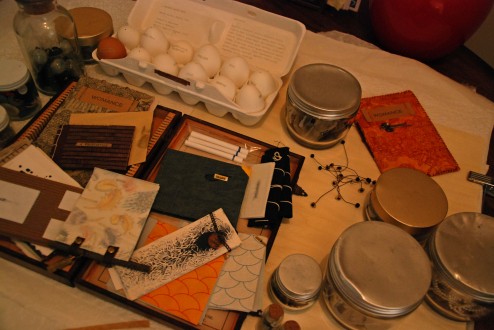 brooklyn
spaces: Okay, well what unifies all of your books?
brooklyn
spaces: Okay, well what unifies all of your books?
Jessica: We try to have the form and the
concept and the text all working off of each other to express the idea. So if
we’re making Tremblement, a book about an earthquake, we
want the title to be off-kilter, and we want a book that is about beginnings to
be inside eggs. It’s the interplay between those elements that makes it
successful to me.
Alaska: We’re both really into the idea of
making moments or making memories, and experience-based work, so we try to add
elements of that to all of our books. We want the book to be an experience that
changes with you as you change it.
brooklyn spaces: Do either of you have a
favorite book you’ve done?
Alaska: Winter is one of my
favorites. That one was one of those books that was sort of painless, sort of
cathartic. We wrote it in winter, basically dealing with that winter sad where
you’re like, “This is hard and awful. Where is everyone?” It’s sort of a little
attempt to reach out and be like, “Hey, I’m here. Hope you are too.”
Jessica: I think that’s what a lot of our
books do. One of the ones I really love is called Loosies; we did for this zine festival at the
Brooklyn Lyceum that was
put on by Susan Thomas, a really awesome librarian from Pratt. We brought this
250-pound cigarette machine and filled it with a series of “loosies” that were
letterpress poems rolled up to look like cigarettes. You could put in a quarter
and dispense a poem.
brooklyn spaces: Do you think making art
books in our internet age is an important rebellion?
Jessica: I feel like artists’ books are
becoming much more popular as a result of the way that publishing is going;
books are now more precious because there’s not going to be as many of
them.
Alaska: A lot of our work is in celebration
of the book as something awesome that you get to hold and smell and flip through
and spill stuff on, and I think that means more now than it used to.
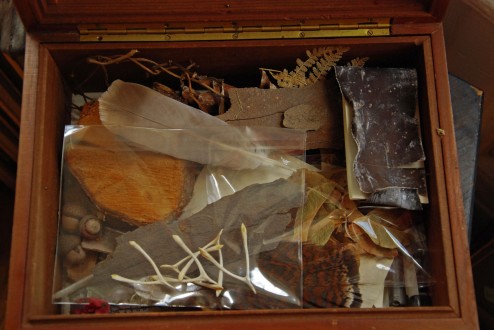 brooklyn
spaces: Is there a community of art book people that you’re inspired
by, or does living in Brooklyn affect the way you make your art?
brooklyn
spaces: Is there a community of art book people that you’re inspired
by, or does living in Brooklyn affect the way you make your art?
Jessica: I don’t know a lot of people who
do what we do. In the niche of book arts, which is itself a very small
community, writing collaboratively is really rare.
Alaska: But we are surrounded by a bunch of
really talented people, so I make books and send them to my friends in the band
Toothaches,
and they send me their music in return, or they’ll send me music to make books
to. There are a lot of really culturally and artistically rich things happening
in Brooklyn.
Jessica: There’s a grassroots artistic
movement here that’s very unironic. People plant and cook and do things because
they love them, because they think that it makes the world a better place.
People are getting past the idea that the artist has to be this suffering lonely
person slaving away in their hovel. You don’t have to be miserable to be a
writer, you don’t have to isolate yourself in order to be passionate.
Alaska: We’re writers, so we obviously
think too much and become depressed about the world, but our books always end up
having this hopeful note, partly because the actual process of making things is
so empowering. I remember reading Deleuze & Guattari, they had this thing in Capitalism and Schizophrenia where they talk
about how everything is so messed up in the world that being able to make stuff
and create is the only way to be in control and process our own lives. I see a
lot of that in Brooklyn and in the people I know. Everyone is using what’s
around them in creative ways.
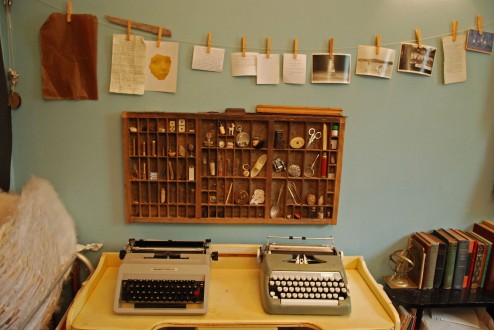 brooklyn
spaces: What are some projects you’re planning to do in the
future?
brooklyn
spaces: What are some projects you’re planning to do in the
future?
Alaska: We want to do more projects for
strangers. We’re going to make little blue nests and hide them around Brooklyn.
It’s sort of a shout-out to this book Bluets, where she talks about these birds that
build blue nests. I read that and thought, “I would shit my pants if I saw a
blue nest!” We want to do things where someone who doesn’t know us can find it,
just random acts of beauty. I love the thought of someone sitting down on a
subway bench and seeing this little blue nest and being like, “What? Is this for
me?” There aren’t enough things like that, and when you do find them it’s so
exciting.
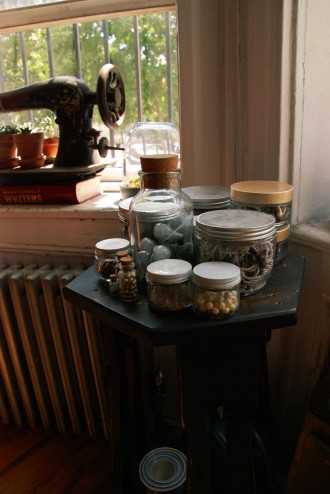 Jessica: I think we’re
scared to use the word “magic.” But you grow up thinking that maybe magical
things could happen, and when you realize that’s not true, it’s pretty
much soul-crushing. So making that magic for people is just so incredibly
rewarding.
Jessica: I think we’re
scared to use the word “magic.” But you grow up thinking that maybe magical
things could happen, and when you realize that’s not true, it’s pretty
much soul-crushing. So making that magic for people is just so incredibly
rewarding.
Alaska: And making those things is just as
good as if they were spontaneously created in the universe. It doesn’t
matter if your friend who has keys to your apartment is the one who left the
awesome thing in your kitchen, it’s the fact that you came home and it was
there. I feel like nothing is too small to make someone a little bit happier.
***
Like this? Read about more makers: Twig Terrariums, Ugly Duckling Presse, Pickett Furniture, Better Than Jam, Arch P&D, Central Booking, Hive NYC, Screwball Spaces, Urbanglass

